Running a business without proper client management is like trying to navigate a ship without a compass—you'll eventually reach your destination, but you'll waste precious time and resources getting there.
I've spent the last decade helping businesses streamline their operations, and if there's one thing I've learned, it's this: the right client management software can literally transform your business overnight.
But here's the problem: there are hundreds of options out there, each claiming to be the "best." Some are overpriced enterprise monsters that'll drain your budget. Others are so basic they're practically useless.
That's why I've tested, compared, and analyzed the top client management software solutions to bring you this comprehensive guide. Whether you're a solopreneur just starting out or running a team of 50+, you'll find the perfect solution here.
What is Client Management Software?
Client management software, also known as Customer Relationship Management (CRM) software, is a digital platform that helps businesses organize, track, and manage all interactions with their clients and prospects.
Think of it as your business's central nervous system—it connects every touchpoint with your customers, from that first inquiry email to the final invoice payment.
Core functions include:
- Contact Management: Store detailed client information, communication history, and preferences
- Sales Pipeline Tracking: Visualize deals moving through your sales process
- Task & Activity Management: Set reminders, schedule follow-ups, and track interactions
- Reporting & Analytics: Gain insights into sales performance and client patterns
- Automation: Streamline repetitive tasks like email follow-ups and data entry
The difference between businesses that scale successfully and those that plateau? The successful ones have systems in place. Client management software IS that system.
What is the Best Client Management Software?
After testing dozens of platforms and analyzing thousands of user reviews, HubSpot CRM emerges as the best overall client management software for most businesses. Here's why:
Why HubSpot CRM Takes the Crown:
- 100% free forever plan with no hidden fees or time limits
- Up to 1 million contacts on the free plan
- Intuitive interface that requires zero training
- Seamless integrations with 1,000+ business tools
- Scalable pricing that grows with your business
- Fully-featured platform, also offering email marketing. Many CRMs offer basic email features, but dedicated email marketing software provides more sophisticated campaign management.
But the "best" software depends entirely on your specific needs. A freelance consultant has different requirements than a 100-person sales team. Freelancers working through freelance platforms need CRM tools that can track diverse client relationships.
Quick Decision Framework:
- Startups/Small Teams: HubSpot CRM (free) or monday.com ($15/user/month)
- Sales-Heavy Businesses: Pipedrive ($14.90/user/month) or Salesforce ($25/user/month)
- Service Businesses: Freshworks CRM ($15/user/month) or Keap ($249/month)
- Enterprise Organizations: Salesforce Enterprise ($165/user/month) or HubSpot Professional ($100/user/month)
Top 12 Best Client Management Software in 2026
Client Management Software Comparison Table
1. HubSpot CRM - Best Overall Client Management Software
Perfect for: Small to medium businesses looking for a comprehensive, free-to-start solution
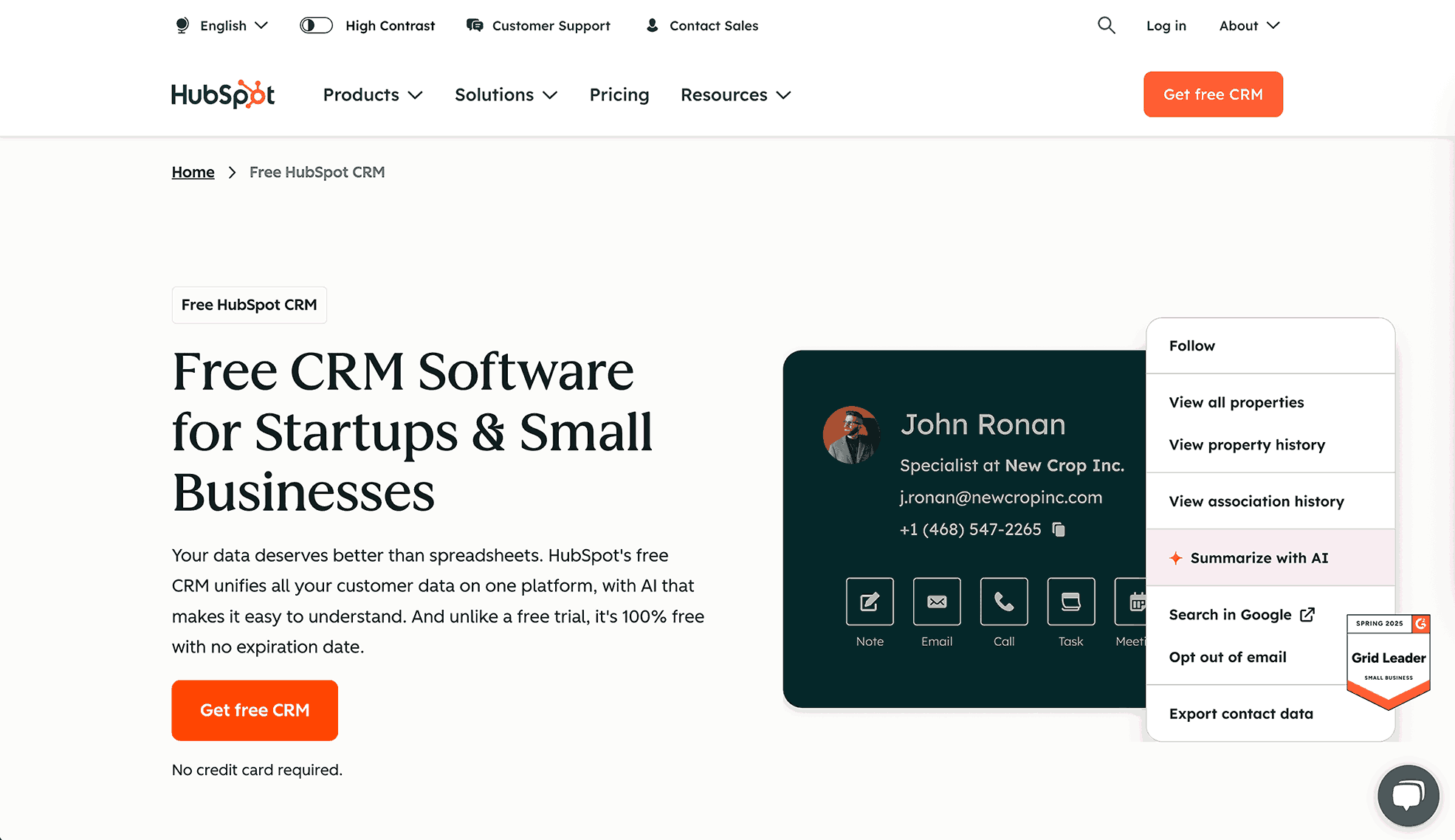
HubSpot CRM powers customer support, sales, and marketing with easy-to-use features like live chat, meeting scheduling, and email tracking. The platform provides a wide array of functionalities, including marketing, sales automation, management of the sales pipeline, managing customer relationships, tracking emails, and organizing contacts and leads.
Key Features:
- Contact Management: Store unlimited contacts with detailed interaction history
- Deal Pipeline: Visual pipeline with customizable stages
- Email Integration: Track opens, clicks, and responses automatically
- Meeting Scheduler: Eliminate back-and-forth scheduling
- Live Chat: Built-in chat widget for your website
- Reporting Dashboard: Real-time insights into sales performance
Pricing:
- Free Plan: $0 (includes 1M contacts, email tracking, deal pipeline)
- Starter: $20/user/month (removes branding, adds automation)
- Professional: $100/user/month (advanced automation, custom reporting)
- Enterprise: $150/user/month (hierarchical teams, advanced permissions)
Pros:
- Generous free plan with enterprise-level features
- Excellent user interface and ease of use
- Strong integration ecosystem
- Comprehensive marketing and sales tools
- No learning curve required
Cons:
- Advanced features like custom objects only available on expensive Enterprise plan
- Can become pricey as you scale
- Limited customization on lower-tier plans
Best For: Small businesses, startups, and any company wanting to test CRM functionality without financial commitment.
2. Salesforce - Best Enterprise Client Management Platform
Perfect for: Large businesses needing extensive customization and advanced features
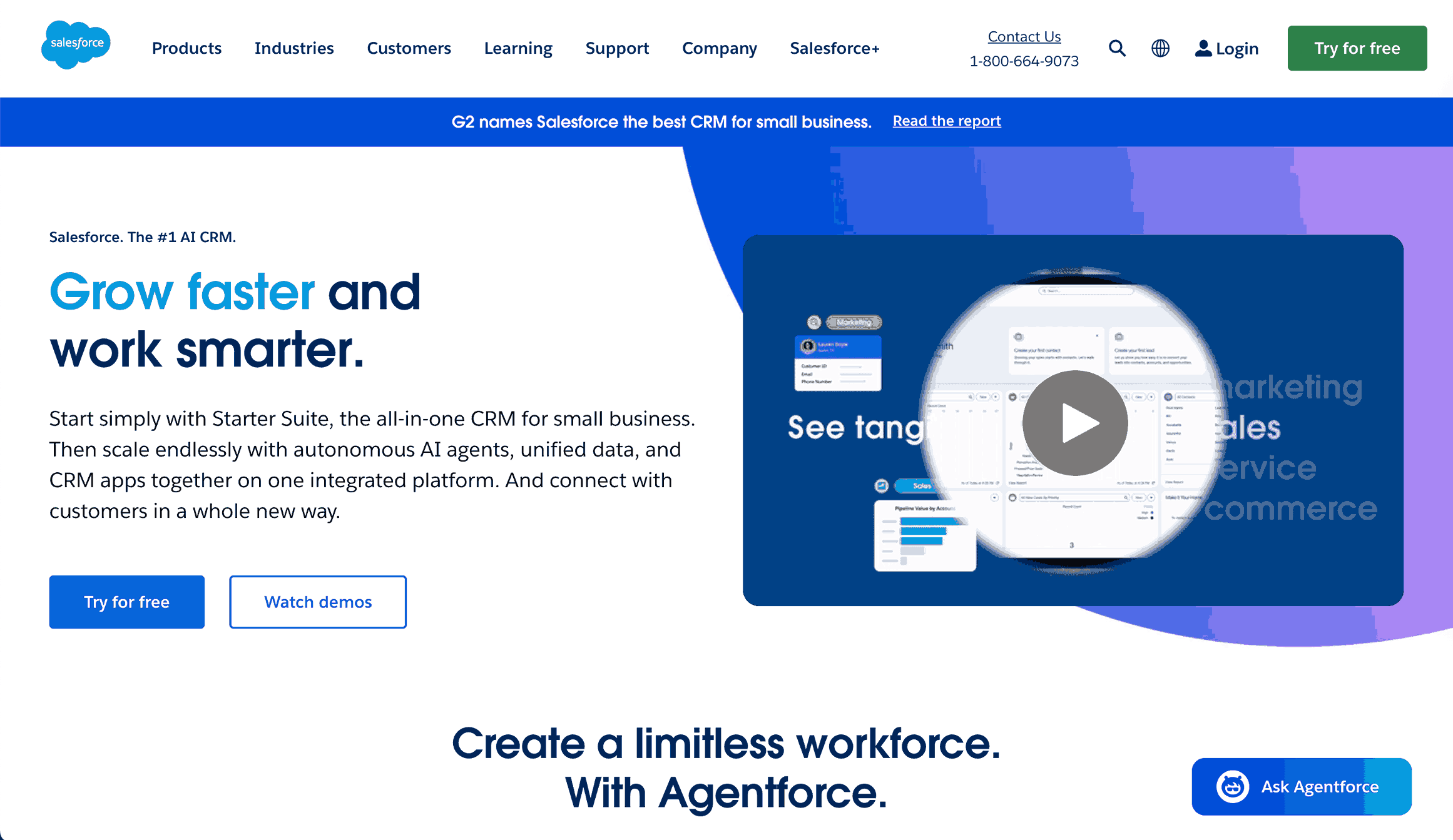
Salesforce Sales Cloud includes all the basics you need for client management, including client records, lead tracking, deals, notes, and more. Its prices start from $25 per month.
Key Features:
- Advanced Automation: Complex workflow automation with AI
- Custom Objects: Create custom data structures
- Einstein AI: Predictive analytics and intelligent insights
- Extensive Integrations: Connect with virtually any business tool
- Mobile App: Full-featured mobile CRM access
- Advanced Reporting: Comprehensive analytics and forecasting
Pricing:
- Starter Suite: $25/user/month (basic CRM for small teams)
- Professional: $80/user/month (workflow automation, collaboration)
- Enterprise: $165/user/month (advanced customization, AI features)
- Unlimited: $330/user/month (unlimited customization, premium support)
Pros:
- Most robust feature set in the market
- Highly customizable and scalable
- Strong AI and automation capabilities
- Excellent third-party integrations
- Industry-leading security and compliance
Cons:
- Complex setup and steep learning curve
- Expensive, especially for small businesses
- Can be overwhelming for simple use cases
- Implementation costs can be significant
Best For: Enterprise organizations with complex sales processes and dedicated CRM administrators.
3. monday.com CRM - Best Customizable Client Management Solution
Perfect for: Teams that need flexibility and visual project management alongside CRM
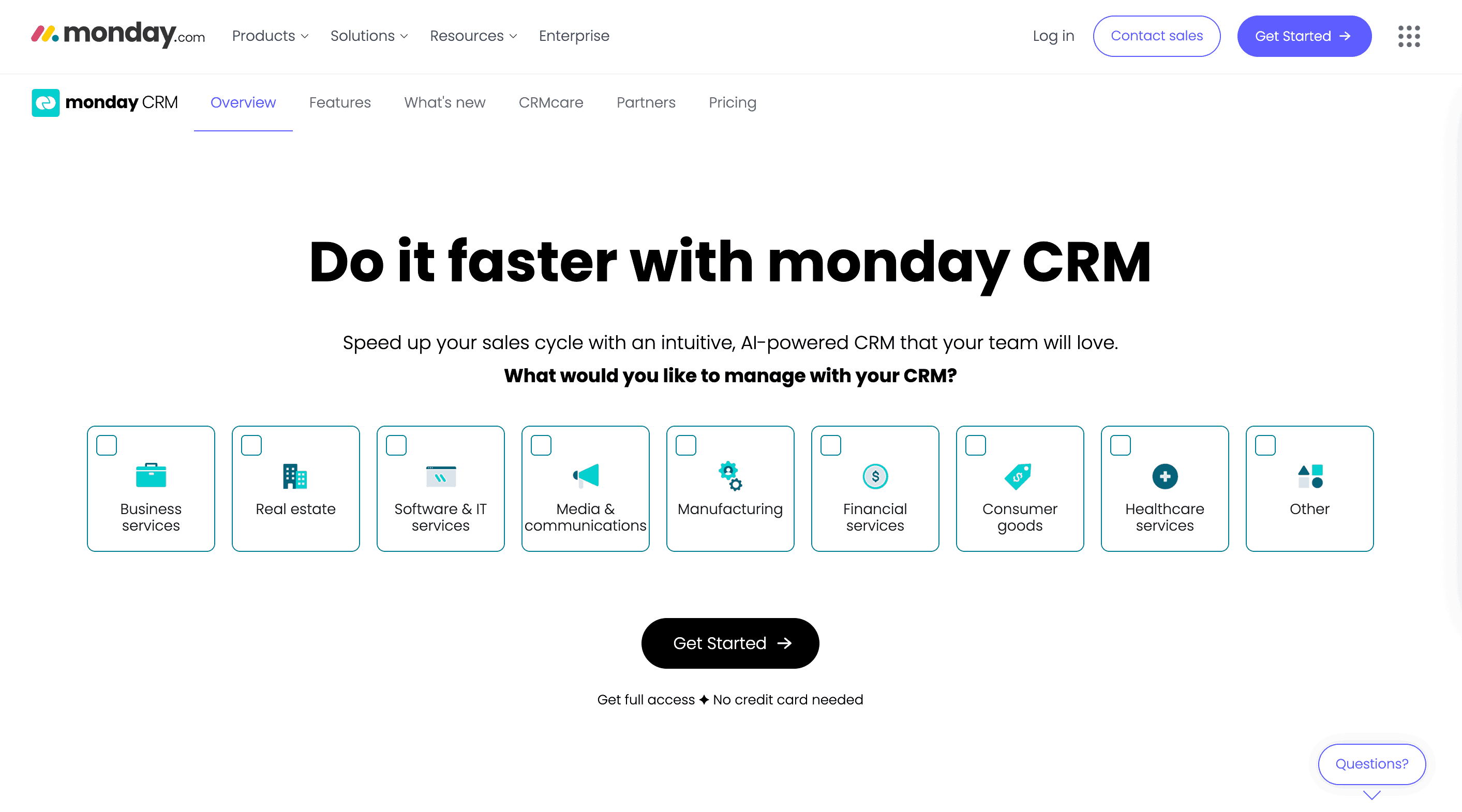
Monday Sales CRM provides a wealth of features to help sales and marketing managers support and get more from their teams. You can create customized workflows and automations to significantly reduce administrative tasks, enhance team collaboration and streamline client communication.
Key Features:
- Visual Boards: Kanban-style interface for managing deals
- Custom Workflows: Build automated processes without coding
- Team Collaboration: Built-in communication and file sharing
- Multiple Views: Calendar, Gantt, Map, and more
- Mobile App: Full mobile functionality
- Integrations: 200+ app integrations
Pricing:
- Basic CRM: $15/user/month (3 users minimum)
- Standard CRM: $20/user/month (timeline view, automations)
- Pro CRM: $25/user/month (advanced features, reporting)
- Enterprise: $33/user/month (enterprise security, advanced permissions)
Pros:
- Highly visual and intuitive interface
- Excellent customization options
- Strong project management features
- Great team collaboration tools
- Flexible automation builder
Cons:
- Limited automation actions on lower plans
- Can be complex for simple CRM needs
- Pricing tiers force minimum user counts
- Advanced reporting requires higher plans
Best For: Creative agencies, project-based businesses, and teams that value visual workflow management.
4. Pipedrive - Best Sales-Focused CRM
Perfect for: Sales teams that live and breathe pipeline management
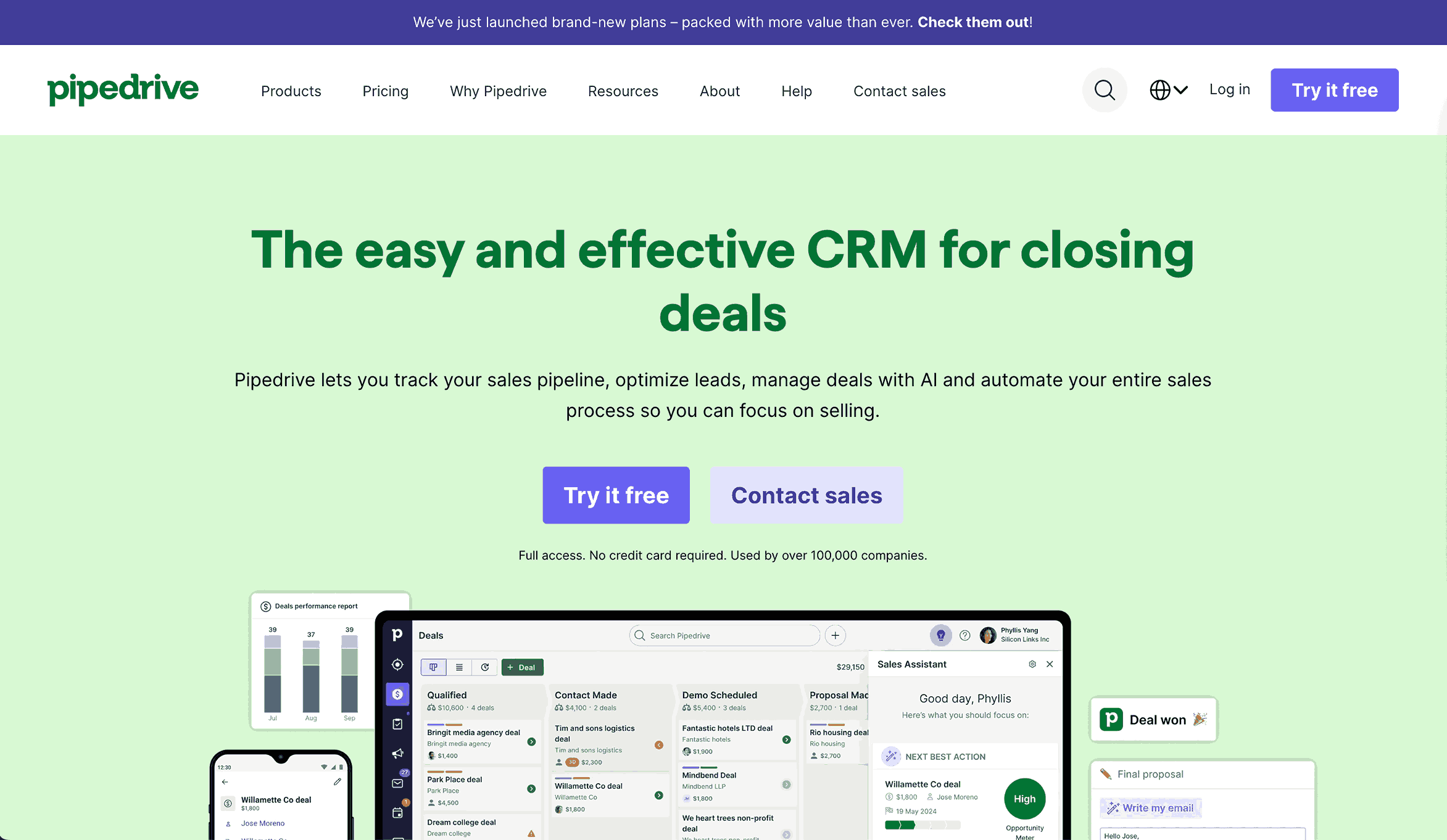
Pipedrive is a sales-focused CRM tool designed to help sales teams manage leads and deals effectively. Known for its intuitive interface and pipeline management capabilities, it's popular among small- to medium-sized businesses.
Key Features:
- Visual Pipeline: Drag-and-drop deal management
- Sales Automation: Automate repetitive sales tasks
- Email Integration: Sync with Gmail and Outlook
- Lead Scoring: Automatically prioritize prospects
- Mobile App: Full mobile CRM access
- Sales Reporting: Detailed sales analytics and forecasting
Pricing:
- Essential: $14.90/user/month (pipeline management, email sync)
- Advanced: $27.90/user/month (automation, email templates)
- Professional: $49.90/user/month (advanced reporting, revenue forecasting)
- Power: $64.90/user/month (projects, campaigns, phone sync)
Pros:
- Excellent pipeline visualization
- Strong sales automation features
- User-friendly interface
- Good mobile app
- Affordable starting price
Cons:
- Limited marketing features
- Basic reporting on lower plans
- Customer support could be better
- Limited customization options
Best For: Sales-driven organizations that prioritize pipeline management and deal tracking.
5. Freshworks CRM - Best Automation-Focused Solution
Perfect for: Businesses wanting to automate their sales and marketing processes
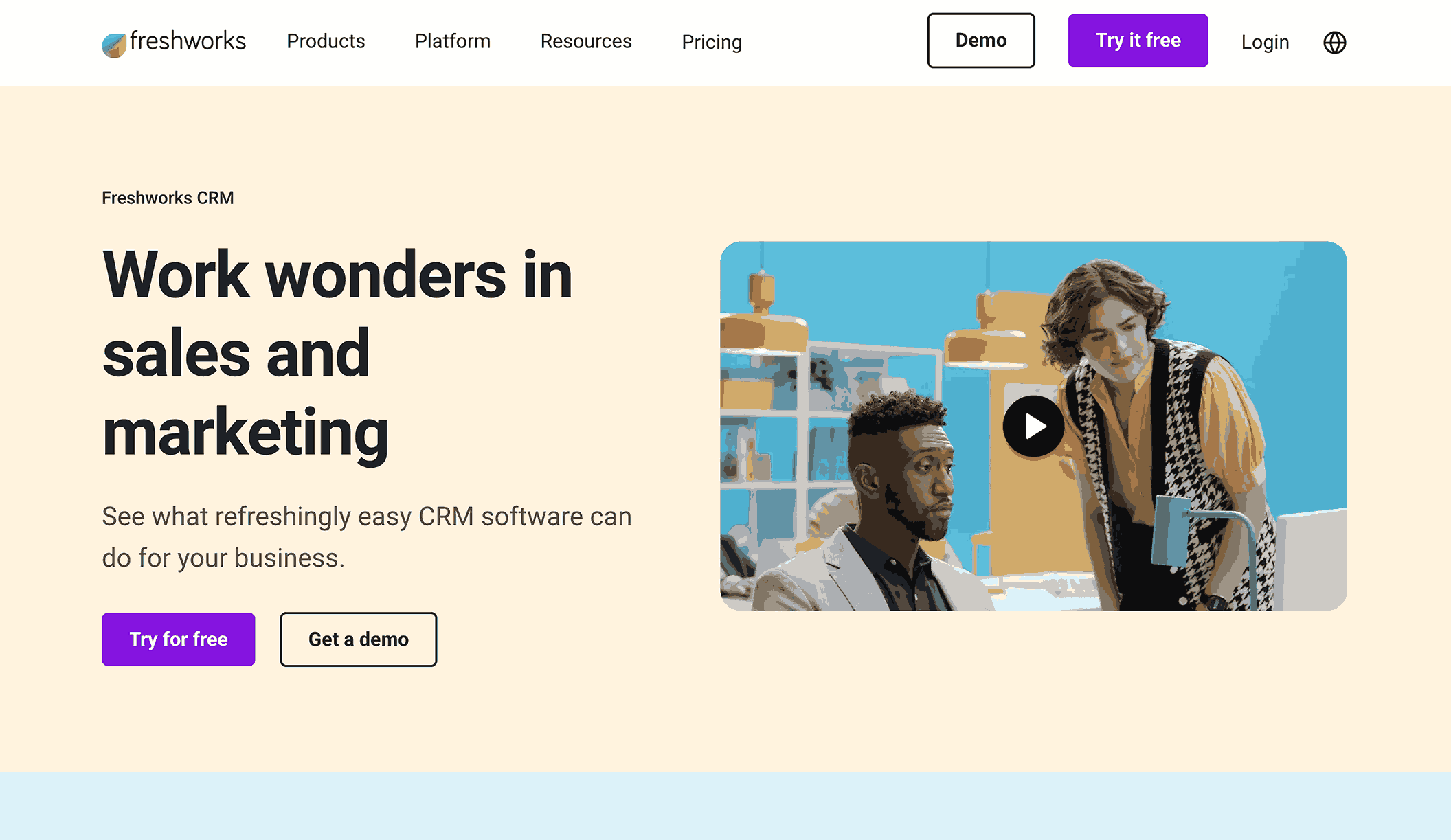
Freshsales organizes all interactions alongside clients' basic information and pulls together entire conversation history with clients through phone, email, chat, SMS, etc.
Key Features:
- AI-Powered Lead Scoring: Freddy AI ranks leads by engagement
- Multi-Channel Communication: Phone, email, chat, SMS integration
- Workflow Automation: Pre-built and custom automation
- Territory Management: Assign leads based on geography
- Advanced Reporting: Customizable dashboards and reports
- Mobile App: Full-featured mobile access
Pricing:
- Free Plan: $0 (up to 3 users, basic features)
- Growth: $15/user/month (automation, phone integration)
- Pro: $39/user/month (advanced automation, custom fields)
- Enterprise: $69/user/month (advanced security, custom reporting)
Pros:
- Strong automation capabilities
- AI-powered lead scoring
- Comprehensive communication tools
- Good value for money
- 21-day free trial
Cons:
- Can be complex for beginners
- Limited customization on lower plans
- Some users report occasional bugs
- Advanced features require higher-tier plans
Best For: Growing businesses that want to automate their sales processes and improve lead qualification.
6. Zoho CRM - Best All-in-One Business Suite
Perfect for: Businesses that want CRM integrated with other business applications
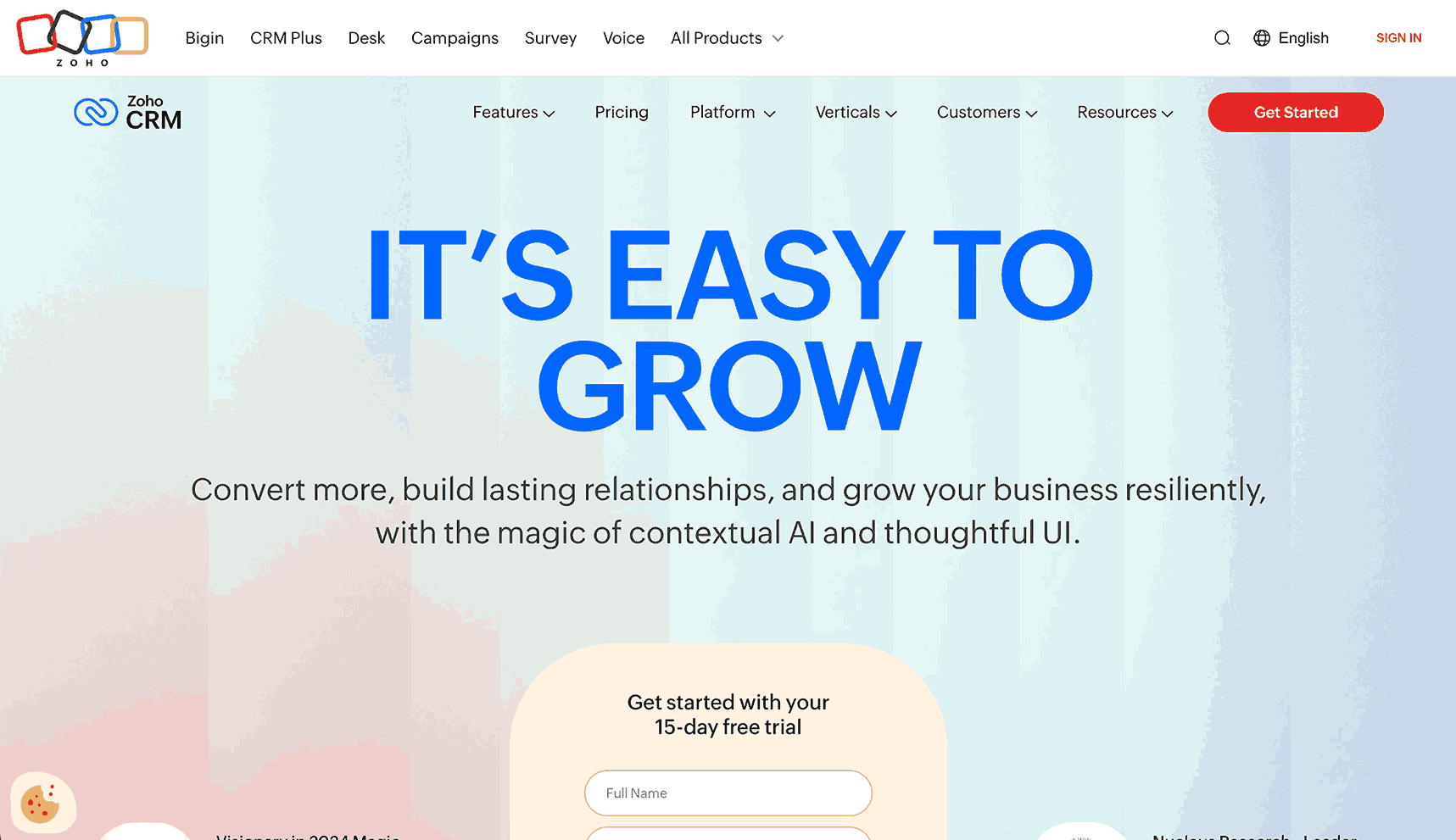
Zoho CRM is a cloud-based platform designed to help businesses simplify the entire sales process and focus on building better customer relationships.
Key Features:
- Lead Management: Capture and nurture leads from multiple sources
- Sales Automation: Workflow automation and process management
- Analytics: AI-powered sales analytics and forecasting
- Integrations: Native integration with 40+ Zoho apps
- Mobile App: Comprehensive mobile functionality
- Customization: Custom fields, modules, and layouts
Pricing:
- Free Plan: $0 (up to 3 users, basic features)
- Standard: $14/user/month (automation, customization)
- Professional: $23/user/month (advanced analytics, validation rules)
- Enterprise: $40/user/month (advanced customization, developer platform)
Pros:
- Comprehensive business suite integration
- Good value for money
- Strong customization options
- AI-powered features
- Generous free plan
Cons:
- Can be overwhelming with too many features
- User interface feels dated
- Learning curve for advanced features
- Limited third-party integrations compared to competitors
Best For: Small to medium businesses already using Zoho products or wanting an all-in-one business solution.
7. Keap (formerly Infusionsoft) - Best for Small Business Marketing Automation
Perfect for: Small businesses needing combined CRM and marketing automation
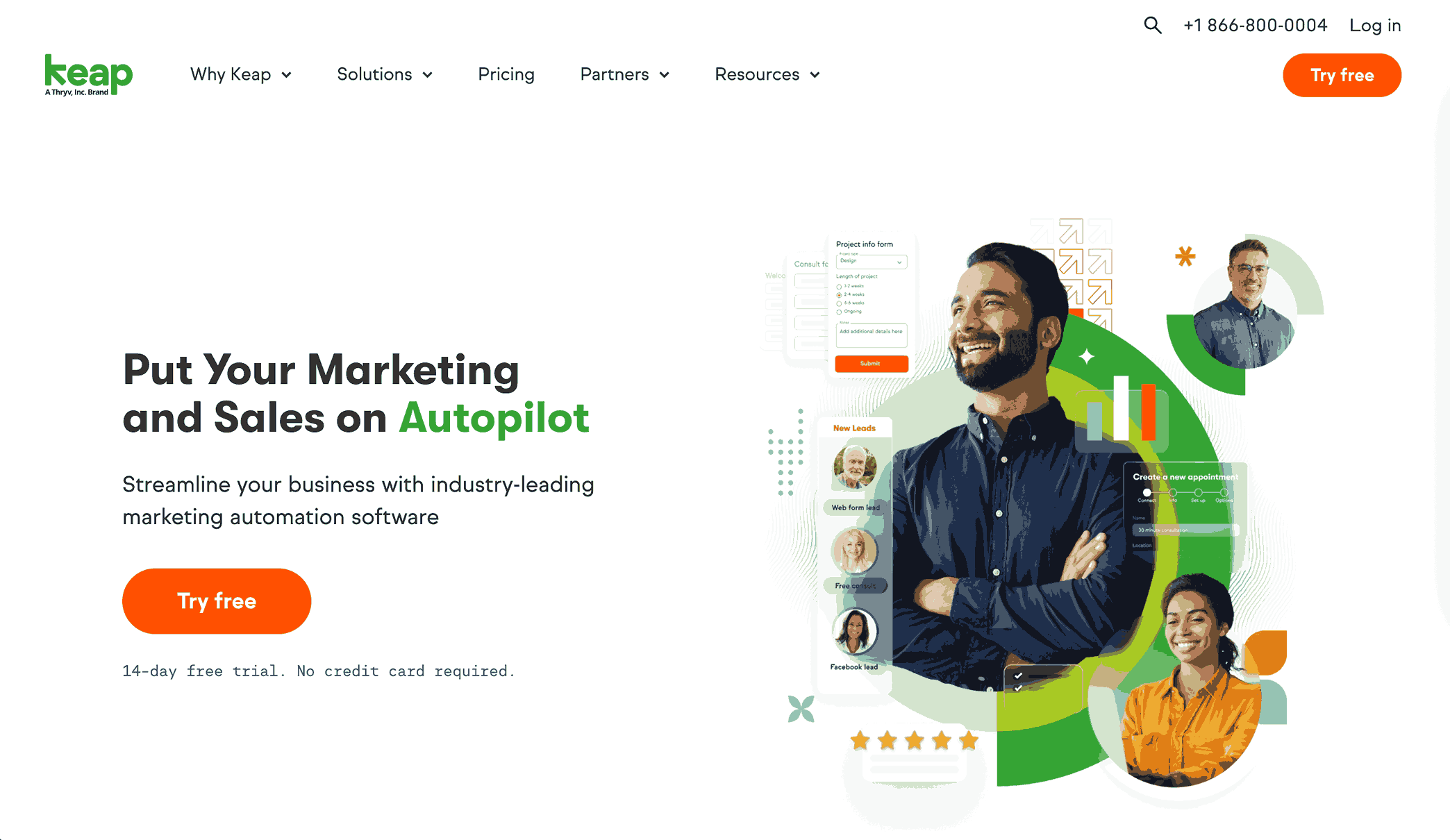
Key Features:
- Marketing Automation: Email campaigns and lead nurturing
- E-commerce Integration: Built-in payment processing
- Appointment Scheduling: Automated booking system
- Landing Pages: Create and optimize landing pages
- Sales Pipeline: Visual deal management
- Text Marketing: SMS campaigns and automation
Pricing:
- Pro: $249/month (up to 2,500 contacts)
- Max: $449/month (advanced automation, affiliate management)
Pros:
- Strong marketing automation
- Built-in e-commerce features
- Good for service-based businesses
- Comprehensive small business solution
- Excellent customer support
Cons:
- Expensive for small businesses
- Steep learning curve
- Limited customization
- Can be complex for simple needs
Best For: Small businesses, coaches, and consultants who need marketing automation alongside CRM.
8. ClickUp - Best Project Management + CRM Hybrid
Perfect for: Teams that want project management and client management in one platform
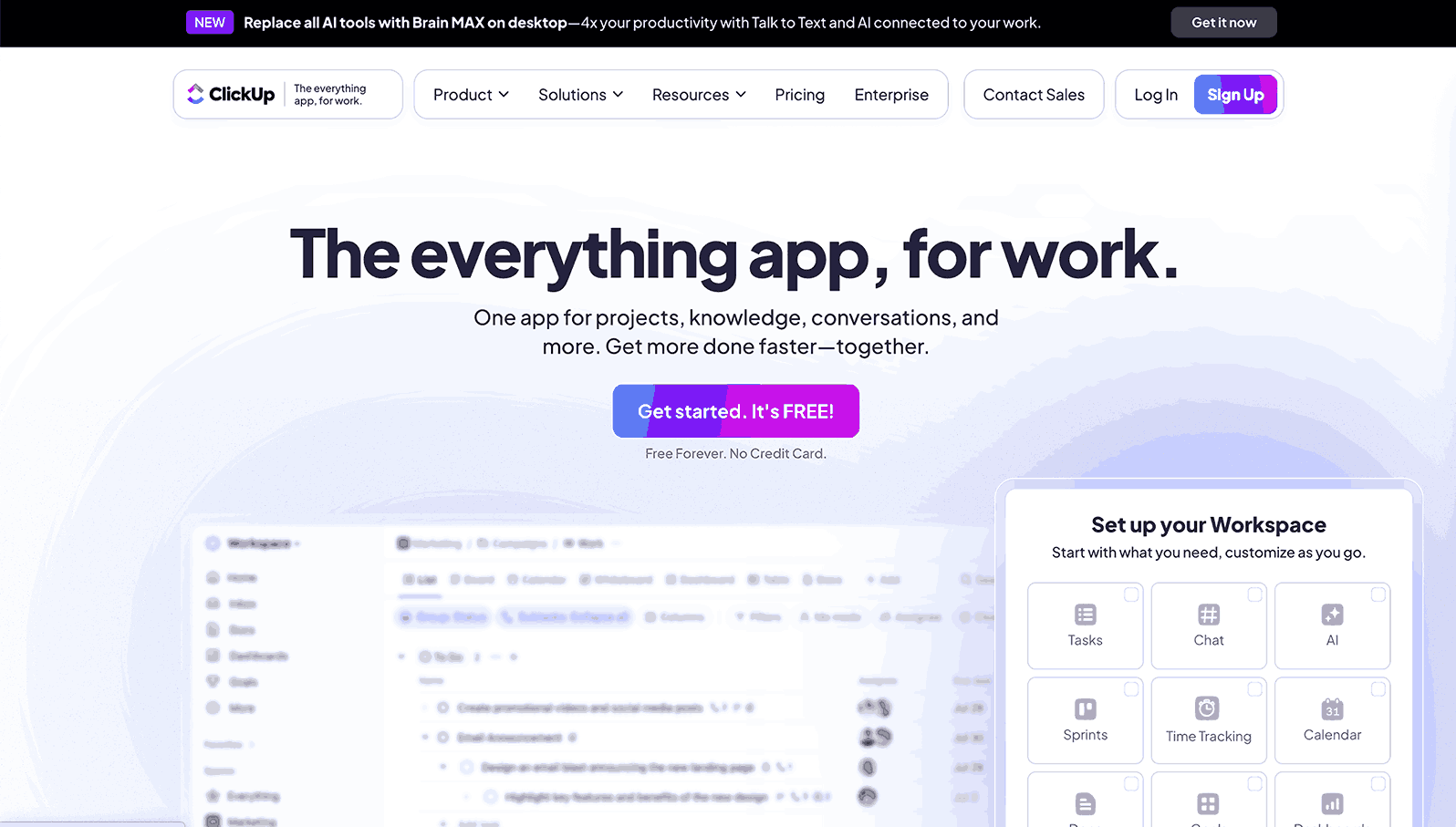
Key Features:
- Project Management: Tasks, timelines, and team collaboration
- Client Portal: Let clients view project progress
- Custom Fields: Tailor data collection to your needs
- Automation: Workflow automation and task management
- Time Tracking: Built-in time tracking and reporting
- Integrations: 1,000+ app integrations
Pricing:
- Free Plan: $0 (unlimited tasks, basic features)
- Unlimited: $7/user/month (unlimited storage, integrations)
- Business: $12/user/month (advanced features, reporting)
- Enterprise: Contact for pricing
Pros:
- Excellent project management features
- Great value for money
- Highly customizable
- Strong collaboration tools
- Generous free plan
Cons:
- Not a pure CRM solution
- Can be overwhelming with features
- Learning curve for new users
- Limited sales-specific features
Best For: Project-based businesses, agencies, and teams that want to combine project management with client tracking.
9. Insightly - Best CRM for Project-Based Businesses
Perfect for: Businesses that manage client projects and relationships together
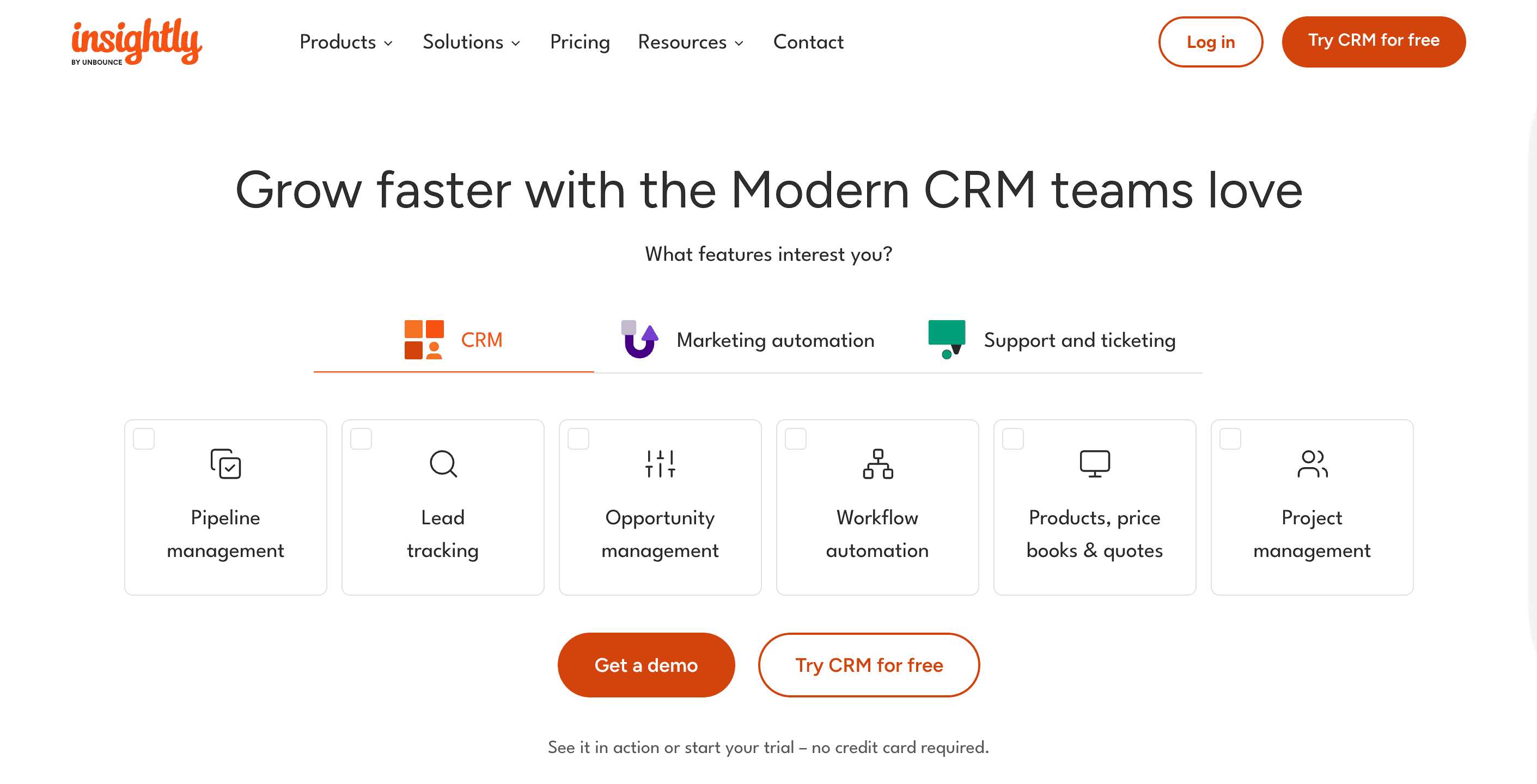
Key Features:
- Project Management: Link projects to client relationships
- Opportunity Management: Track deals and sales opportunities
- Email Integration: Automatic email capture and tracking
- Custom Fields: Tailor CRM to your business needs
- Reporting: Built-in reports and dashboards
- Mobile App: Full mobile functionality
Pricing:
- Plus: $29/user/month (contact management, projects)
- Professional: $49/user/month (workflow automation, advanced reporting)
- Enterprise: $99/user/month (advanced customization, security)
Pros:
- Good integration of CRM and project management
- Reasonable pricing for features offered
- Good customization options
- Strong reporting capabilities
- User-friendly interface
Cons:
- Limited free plan
- Customer support could be better
- Advanced features only on higher plans
- Not as feature-rich as dedicated CRMs
Best For: Professional services firms, consultants, and businesses that need to track both client relationships and project delivery.
10. Copper - Best CRM for Google Workspace Users
Perfect for: Teams that live in Google Workspace and want seamless integration
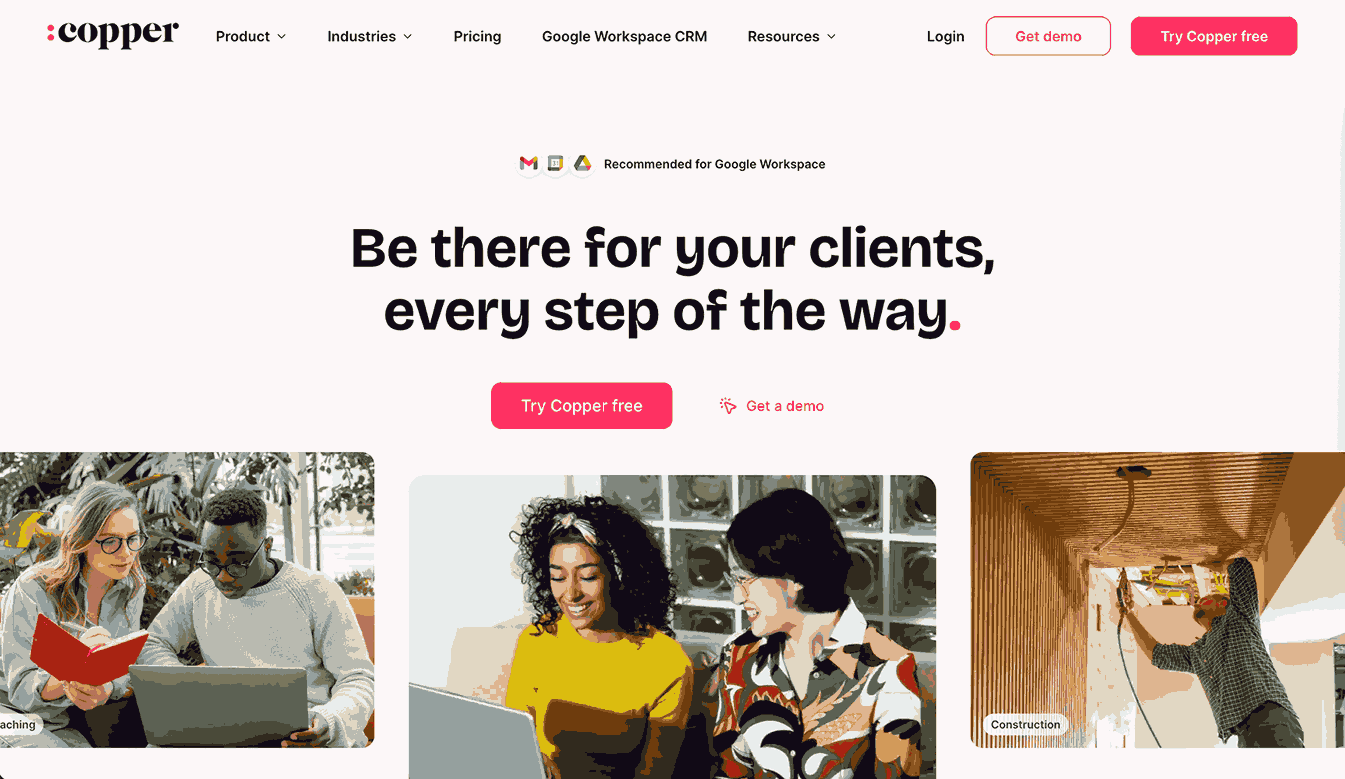
Key Features:
- Native Google Integration: Built specifically for Google Workspace
- Automatic Data Capture: Automatically log emails and meetings
- Pipeline Management: Visual deal tracking
- Relationship Mapping: See connections between contacts
- Mobile App: Full mobile CRM access
- Automation: Workflow automation and task management
Pricing:
- Basic: $25/user/month (basic CRM features)
- Professional: $59/user/month (automation, advanced reporting)
- Business: $119/user/month (advanced features, customization)
Pros:
- Excellent Google Workspace integration
- Automatic data capture
- Clean, intuitive interface
- Good automation features
- Strong relationship mapping
Cons:
- Expensive compared to alternatives
- Limited integrations outside Google ecosystem
- Basic reporting on lower plans
- Not ideal for non-Google users
Best For: Teams heavily invested in Google Workspace who want CRM that feels native to their existing workflow.
11. Airtable - Best Database-Style CRM
Perfect for: Teams that prefer spreadsheet-like interfaces with database power
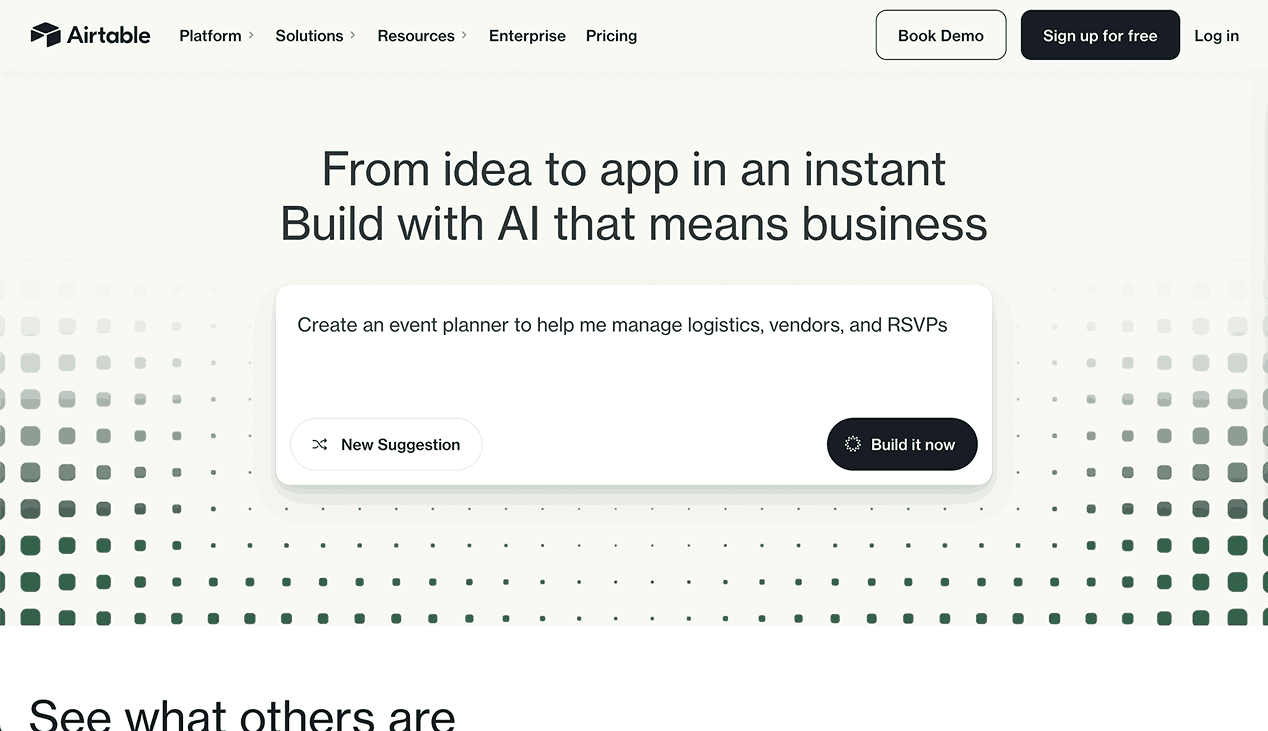
Key Features:
- Flexible Database: Spreadsheet interface with database functionality
- Custom Views: Grid, Calendar, Kanban, Gallery views
- Automation: Workflow automation between records
- Collaboration: Real-time team collaboration
- Integrations: Connect with 1,000+ apps
- Mobile App: Full mobile functionality
Pricing:
- Free Plan: $0 (1,200 records per base)
- Plus: $10/user/month (5,000 records, advanced features)
- Pro: $20/user/month (50,000 records, advanced permissions)
- Enterprise: Contact for pricing
Pros:
- Highly flexible and customizable
- Familiar spreadsheet interface
- Strong collaboration features
- Good value for money
- Excellent for custom workflows
Cons:
- Not a traditional CRM
- Limited sales-specific features
- Can be complex for simple needs
- Record limits on lower plans
Best For: Teams that want flexibility to create custom client management workflows and prefer spreadsheet-style interfaces.
12. Capsule CRM - Best Simple CRM for Small Teams
Perfect for: Small businesses that want simple, effective client management without complexity
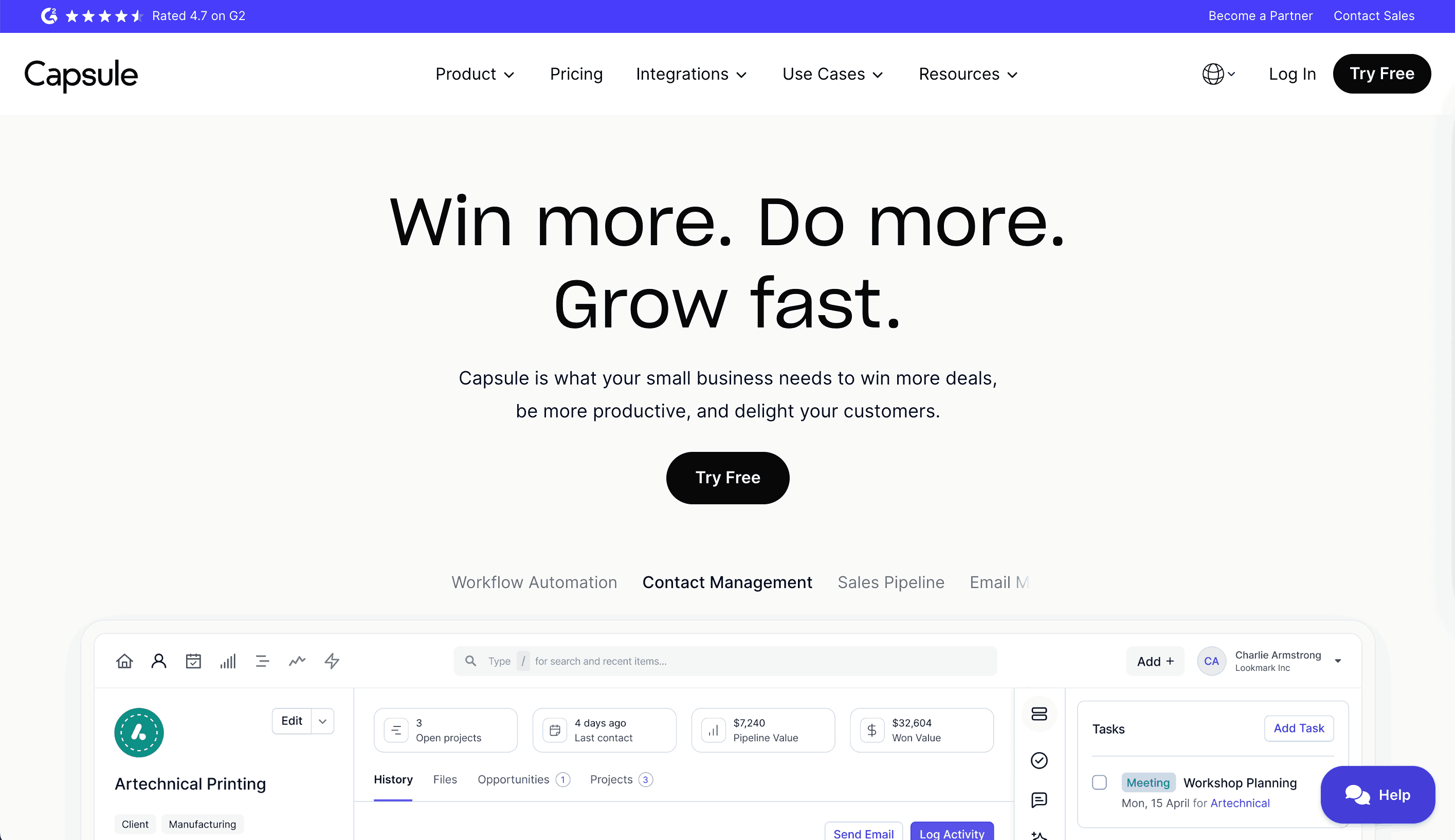
Key Features:
- Contact Management: Simple, clean contact organization
- Sales Pipeline: Basic deal tracking
- Task Management: Set reminders and follow-ups
- Email Integration: Track email interactions
- Reporting: Basic sales reports
- Mobile App: Mobile access to contacts and deals
Pricing:
- Free Plan: $0 (up to 2 users, 250 contacts)
- Professional: $18/user/month (unlimited contacts, advanced features)
Pros:
- Very simple and easy to use
- Affordable pricing
- Good for small teams
- Clean interface
- Free plan available
Cons:
- Limited features compared to competitors
- Basic automation
- Limited integrations
- Not suitable for complex sales processes
Best For: Very small businesses and solo entrepreneurs who want basic client management without complexity.
What is a Good Free Program to Keep Track of Clients?
HubSpot CRM is hands-down the best free client management software available in 2026.
Here's what you get with HubSpot's free plan:
- 1 million contacts (yes, you read that right)
- Unlimited deal tracking with visual pipeline
- Email integration with open/click tracking
- Meeting scheduler with calendar sync
- Live chat widget for your website
- Basic reporting dashboard
- Mobile app access
Other solid free options include:
Zoho CRM Free
- Up to 3 users
- Lead and contact management
- Sales pipeline tracking
- Basic automation
- Mobile app access
Freshworks CRM Free
- Up to 3 users
- Contact management
- Deal tracking
- Email integration
- Basic reporting
ClickUp Free
- Unlimited tasks and users
- Basic client tracking
- Project management features
- Time tracking
- 100MB storage
The reality check: While these free plans are genuinely useful, most growing businesses will eventually need paid features like advanced automation, custom reporting, or extended user limits. The key is starting with a platform that can scale with you.
What is the Best Way to Keep Track of Clients?
The best way to keep track of clients isn't about the specific software—it's about creating a systematic approach that your entire team follows religiously.
The 5-Pillar Client Tracking Framework
1. Centralize Everything
- One source of truth: All client information lives in your CRM, not scattered across emails, spreadsheets, and sticky notes
- Consistent data entry: Establish standard fields and naming conventions
- Regular updates: Make updating client records part of your daily routine
2. Automate Data Capture
- Email integration: Automatically log all email communications
- Web forms: Capture leads directly into your CRM
- Call logging: Record phone conversations and meeting notes
- Activity tracking: Monitor website visits and email engagement
3. Implement Standard Processes
- Lead qualification: Define criteria for moving prospects through your pipeline
- Follow-up schedules: Set automatic reminders for client touchpoints
- Project milestones: Track key deliverables and deadlines
- Communication protocols: Establish how and when to contact clients
4. Monitor Key Metrics
- Client lifetime value: Track revenue per client over time
- Response times: Monitor how quickly you respond to client inquiries
- Project completion rates: Measure on-time delivery performance
- Client satisfaction: Regular check-ins and feedback collection
5. Regular Reviews and Optimization
- Weekly pipeline reviews: Assess deal progress and identify bottlenecks
- Monthly client health checks: Evaluate relationship strength and opportunities
- Quarterly process audits: Refine your tracking and management processes
- Annual strategy reviews: Align client management with business goals
Essential Client Information to Track
Contact Details:
- Primary and secondary contacts
- Phone numbers, email addresses
- Physical and billing addresses
- Preferred communication methods
- Time zones and availability
Business Information:
- Company size and industry
- Annual revenue and budget
- Decision-making process
- Key pain points and challenges
- Competitor relationships
Interaction History:
- All communications (emails, calls, meetings)
- Project timelines and deliverables
- Payment history and terms
- Support requests and resolutions
- Feedback and testimonials
Sales Information:
- Lead source and acquisition cost
- Sales cycle length
- Deal value and probability
- Next steps and follow-up dates
- Barriers to closing
The most successful businesses I've worked with treat client tracking as a strategic advantage, not just administrative overhead. They use their CRM data to identify upselling opportunities, predict churn, and deliver personalized experiences that keep clients coming back.
How to Choose the Best Client Management Software for Your Business
Choosing the wrong CRM is like buying a sports car when you need a pickup truck—expensive and impractical. Here's my proven framework for making the right choice:
Step 1: Define Your Must-Have Requirements
Start with your pain points:
- Are you losing track of client communications?
- Do deals fall through the cracks?
- Is your team duplicating efforts?
- Are you missing follow-up opportunities?
Essential features checklist:
- Contact management and organization
- Sales pipeline visualization
- Email integration and tracking
- Task and activity management
- Basic reporting and analytics
- Mobile access
- Integration with existing tools
Nice-to-have features:
- Marketing automation
- Advanced reporting
- Custom fields and workflows
- Multi-user permissions
- API access
Step 2: Consider Your Team Size and Growth Plans
Solo entrepreneurs and small teams (1-5 users):
- Recommended: HubSpot CRM (free), Pipedrive, or Freshworks CRM
- Priority: Ease of use, affordable pricing, essential features
- Avoid: Complex enterprise solutions with steep learning curves
Growing businesses (5-25 users):
- Recommended: HubSpot Professional, monday.com, or Salesforce Professional
- Priority: Scalability, automation, team collaboration
- Avoid: Solutions that don't offer user management or advanced features
Enterprise organizations (25+ users):
- Recommended: Salesforce Enterprise, HubSpot Enterprise, or Microsoft Dynamics
- Priority: Advanced customization, security, compliance, integration capabilities
- Avoid: Simple solutions that won't handle complex processes
Step 3: Evaluate Integration Requirements
Common integration needs:
- Email platforms (Gmail, Outlook)
- Calendar applications
- Accounting software. Common integration needs include accounting software integration like QuickBooks or Xero for seamless financial management.
- Marketing tools (Mailchimp, Constant Contact)
- Project management tools
- Communication platforms (Slack, Microsoft Teams)
Questions to ask:
- Does the CRM integrate natively with your existing tools?
- Are third-party integration options available (Zapier, API)?
- What's the cost of integrations?
- How complex is the setup process?
Step 4: Test Before You Commit
Take advantage of free trials:
- Most CRM providers offer 14-30 day free trials
- Test with real data, not dummy information
- Involve your entire team in the evaluation
- Focus on daily workflows, not just features
Evaluation criteria:
- Ease of use: Can your team adopt it quickly?
- Performance: Does it load quickly and work reliably?
- Mobile experience: Is the mobile app functional?
- Support quality: How responsive is customer support?
- Data import: Can you easily migrate existing data?
Step 5: Calculate Total Cost of Ownership
Beyond the monthly subscription:
- Setup and implementation costs
- Data migration expenses
- Training time and resources
- Third-party integration costs
- Customization and development fees
- Ongoing maintenance and support
ROI considerations:
- Time saved on administrative tasks
- Improved sales conversion rates
- Better client retention
- Increased team productivity
- Enhanced customer satisfaction
Key Features to Look for in Client Management Software
Essential Features (Must-Haves)
- Contact Management - Your CRM should be able to store comprehensive client information including contact details, company information, communication preferences, and interaction history. Look for features like duplicate detection, contact segmentation, and easy search functionality.
- Sales Pipeline Management - A visual representation of your sales process is crucial. The best CRMs offer drag-and-drop functionality, customizable pipeline stages, and the ability to track deal progress and probability.
- Communication Tracking - Integration with email platforms to automatically log communications, track email opens and clicks, and maintain a complete conversation history with each client.
- Task and Activity Management - Set reminders, schedule follow-ups, and assign tasks to team members. Look for calendar integration and automated task creation based on deal stage changes. For advanced automation without coding, consider integrating no-code automation tools with your CRM.
- Basic Reporting and Analytics - Essential reports include sales performance, pipeline analysis, activity reports, and contact engagement metrics. The ability to create custom reports is a significant advantage.
- Mobile Access -Your team needs access to client information on the go. Look for fully functional mobile apps, not just mobile-responsive websites.
Advanced Features (Nice-to-Haves)
- Marketing Automation - Email campaigns, lead nurturing sequences, and automated follow-ups based on client behavior and engagement.
- Custom Fields and Objects - The ability to add custom data fields and create custom object types to match your specific business needs.
- Workflow Automation - Automate repetitive tasks like data entry, email sending, task creation, and deal stage progression based on triggers and conditions.
- Advanced Reporting - Custom dashboards, real-time analytics, forecasting tools, and the ability to create complex reports with multiple data sources.
- Integration Capabilities -Native integrations with popular business tools and robust API access for custom integrations.
- Multi-User Permissions - Role-based access control, team management features, and the ability to restrict access to sensitive client information.
- Document Management - Store and organize client documents, contracts, proposals, and other files within the CRM system.
Industry-Specific Features
Service-Based Businesses:
- Project management integration
- Time tracking capabilities
- Invoice and billing features
- Service ticket management
- Client portal access
E-commerce Businesses:
- Order tracking and history
- Inventory management integration
- Customer segmentation tools
- Abandoned cart recovery
- Product recommendation engines
Real Estate:
- Property listing management
- Commission tracking
- Lead source attribution
- Market analysis tools
- Document transaction management
Healthcare:
- HIPAA compliance features
- Appointment scheduling
- Treatment history tracking
- Insurance information management
- Telehealth integration
Common Client Management Software Mistakes to Avoid
1. Choosing Based on Features, Not Needs
The mistake: Getting excited about advanced features you'll never use while ignoring basic functionality you need daily.
The solution: Start with your current pain points and work backwards. Choose software that solves your immediate problems first, then grows with you.
2. Skipping the Data Migration Plan
The mistake: Assuming you can easily move your existing client data to a new system.
The solution: Before choosing any CRM, understand exactly how you'll migrate your data. Ask about data import tools, professional migration services, and potential data formatting requirements.
3. Inadequate User Training
The mistake: Expecting your team to figure out the new system on their own.
The solution: Budget time and resources for proper training. Most CRM failures are due to poor adoption, not bad software.
4. Over-Customizing from Day One
The mistake: Spending weeks customizing fields, workflows, and processes before using the system.
The solution: Start with out-of-the-box functionality, learn the system, then gradually add customizations based on actual usage patterns.
5. Ignoring Mobile Experience
The mistake: Choosing a CRM based solely on desktop experience.
The solution: Test the mobile app thoroughly. Your team will need access to client information when they're out of the office.
6. Underestimating Integration Complexity
The mistake: Assuming all integrations will be simple and straightforward.
The solution: Test critical integrations during your trial period. Understand any limitations or additional costs involved.
Free vs. Paid Client Management Software: What You Need to Know
When Free Software is Enough
Free client management software works well for:
- Solo entrepreneurs and very small teams (1-3 people)
- Businesses with simple sales processes
- Companies just starting with CRM
- Basic contact management needs
- Limited budget constraints
Top free options and their limitations:
HubSpot CRM Free:
- ✅ 1 million contacts, unlimited users
- ✅ Deal pipeline, email tracking, reporting
- ❌ Advanced automation limited
- ❌ HubSpot branding on emails
- ❌ Limited customer support
Zoho CRM Free:
- ✅ Up to 3 users, basic automation
- ✅ Lead and contact management
- ❌ Limited to 5,000 records
- ❌ Basic reporting only
- ❌ No phone support
Freshworks CRM Free:
- ✅ Up to 3 users, basic features
- ✅ Contact management, deal tracking
- ❌ Limited email templates
- ❌ Basic automation only
- ❌ Limited integrations
When You Need Paid Software
Upgrade to paid plans when you need:
- Advanced automation for complex workflows
- Custom reporting and analytics
- Multiple user management with permissions
- Advanced integrations with business tools
- Professional support and training
- Custom fields and object types
- Marketing automation features
- White-label branding options
The upgrade tipping point: Most businesses find they need paid features when they reach 5+ team members or 1,000+ active contacts.
Cost-Benefit Analysis Framework
Calculate your time savings:
- Manual tasks eliminated per week
- Multiply by hourly wage of team members
- Compare to monthly software cost
- Factor in improved conversion rates
Example calculation:
- 10 hours/week saved on manual tasks
- Average team wage: $25/hour
- Monthly time savings value: $1,000
- CRM cost: $200/month
- Net benefit: $800/month
Client Management Best Practices
1. Establish Data Entry Standards
Create consistent naming conventions:
- Company names: "ABC Corporation" not "abc corp" or "ABC Corp."
- Contact titles: Use standardized job titles
- Tags and categories: Maintain a master list
- Custom fields: Define clear usage guidelines
Required vs. optional fields:
- Make critical information required (name, email, company)
- Keep optional fields to a minimum initially
- Add requirements gradually based on actual needs
2. Implement Regular Data Hygiene
Weekly tasks:
- Remove duplicate contacts
- Update incomplete records
- Verify email addresses
- Clean up outdated information
Monthly reviews:
- Audit data quality metrics
- Review and update custom fields
- Check integration accuracy
- Assess user adoption rates
Quarterly cleanups:
- Archive inactive contacts
- Review and update processes
- Evaluate software performance
- Plan system improvements
3. Design Effective Client Communication Workflows
Lead nurturing sequence:
- Immediate response (within 5 minutes of inquiry)
- Follow-up call (within 24 hours)
- Proposal delivery (within 48-72 hours)
- Check-in calls (every 3-5 days until decision)
- Post-decision follow-up (win or lose)
Client onboarding process:
- Welcome email with next steps
- Kick-off meeting scheduling
- Document collection and review
- Project timeline establishment
- Regular check-in scheduling
Ongoing relationship management:
- Monthly check-ins for active clients
- Quarterly business reviews for key accounts
- Annual satisfaction surveys
- Holiday and milestone greetings
- Upselling opportunity identification
4. Leverage Automation Strategically
High-impact automation opportunities:
- Lead assignment based on territory or expertise
- Follow-up reminders for overdue tasks
- Email sequences for lead nurturing
- Deal stage progression notifications
- Data entry from forms and emails
Automation rules to implement:
IF new lead from website form
THEN assign to territory manager
AND send welcome email sequence
AND create follow-up task
IF deal inactive for 30 days
THEN notify account manager
AND add to "at-risk" list
AND schedule check-in call
IF client contract expires in 60 days
THEN create renewal opportunity
AND notify account manager
AND start renewal conversation sequence
5. Create Meaningful Reports and Metrics
Essential KPIs to track:
Sales Performance:
- Monthly recurring revenue (MRR)
- Sales cycle length
- Win/loss rates by source
- Pipeline velocity
- Quota attainment
Client Health:
- Client lifetime value (CLV)
- Client retention rate
- Net Promoter Score (NPS)
- Support ticket volume
- Project completion rates
Team Performance:
- Activities per rep per day
- Response time to inquiries
- Meeting-to-opportunity ratio
- Proposal-to-close ratio
- Revenue per employee
Marketing Effectiveness:
- Lead source performance
- Cost per acquisition (CPA)
- Lead conversion rates
- Campaign ROI
- Content engagement
Implementation Timeline: Getting Started in 30 Days
Week 1: Foundation Setup
Days 1-2: Software Selection and Setup
- Choose your CRM platform
- Create admin account
- Configure basic settings
- Import existing contact data
- Set up user accounts
Days 3-4: Data Organization
- Clean and organize existing client data
- Establish naming conventions
- Create custom fields if needed
- Set up sales pipeline stages
- Configure basic automation
Days 5-7: Integration Setup
- Connect email accounts
- Link calendar applications
- Set up essential integrations
- Test all connections
- Configure mobile apps
Week 2: Process Design
Days 8-10: Workflow Definition
- Map out client lifecycle stages
- Define standard processes
- Create email templates
- Set up task templates
- Design reporting structure
Days 11-14: Team Training
- Conduct CRM training sessions
- Create process documentation
- Assign roles and responsibilities
- Practice with test data
- Address initial questions
Week 3: Soft Launch
Days 15-17: Limited Rollout
- Start with one team or department
- Use real client data carefully
- Monitor system performance
- Collect user feedback
- Make initial adjustments
Days 18-21: Process Refinement
- Identify workflow bottlenecks
- Adjust automation rules
- Improve data entry processes
- Enhance reporting accuracy
- Address user concerns
Week 4: Full Implementation
Days 22-24: Company-wide Launch
- Roll out to all team members
- Migrate all client data
- Activate all automation
- Begin using for daily operations
- Monitor system adoption
Days 25-30: Optimization
- Review performance metrics
- Gather comprehensive feedback
- Make final adjustments
- Plan ongoing improvements
- Schedule regular reviews
Industry-Specific Client Management Solutions
Professional Services (Consultants, Lawyers, Accountants)
Recommended software: Insightly, HubSpot Professional, or Salesforce Professional
Key requirements:
- Project management integration
- Time tracking capabilities
- Document management
- Billing and invoicing
- Client portal access
Best practices:
- Track project milestones within client records
- Link time entries to specific clients and projects
- Use document libraries for contracts and deliverables
- Set up automated billing based on time tracking
- Create client dashboards for project visibility
E-commerce and Retail
Recommended software: HubSpot, Salesforce Commerce Cloud, or Zoho CRM
Key requirements:
- Order history tracking
- Inventory integration
- Customer segmentation
- Email marketing automation
- Analytics and reporting
Best practices:
- Segment customers by purchase behavior
- Automate post-purchase follow-up sequences
- Track customer lifetime value
- Use purchase data for personalized recommendations
- Implement abandoned cart recovery workflows
Real Estate
Recommended software: Pipedrive, Copper, or specialized real estate CRMs
Key requirements:
- Property listing management
- Commission tracking
- Lead source attribution
- Document management
- Market analysis integration
Best practices:
- Track lead sources and their conversion rates
- Maintain detailed property and client matching
- Use automated drip campaigns for lead nurturing
- Implement follow-up sequences for past clients
- Track referral sources and reward accordingly
Healthcare and Wellness
Recommended software: Salesforce Health Cloud or specialized healthcare CRMs
Key requirements:
- HIPAA compliance
- Appointment scheduling
- Treatment history tracking
- Insurance management
- Telehealth integration
Best practices:
- Ensure all data handling meets HIPAA requirements
- Integrate with practice management systems
- Use automated appointment reminders
- Track patient outcomes and satisfaction
- Implement referral tracking systems
Creative Agencies and Freelancers
Recommended software: monday.com, ClickUp, or HubSpot
Key requirements:
- Project portfolio management
- Creative asset storage
- Client collaboration tools
- Time tracking
- Invoice management
Best practices:
- Link projects to client relationships
- Use visual project timelines
- Create client-accessible project portals
- Track creative briefs and revisions
- Implement feedback and approval workflows
Future of Client Management Software
Emerging Trends for 2026 and Beyond
Artificial Intelligence Integration
- Predictive analytics for identifying at-risk clients
- Automated lead scoring based on behavior patterns
- AI-powered chatbots for initial client interactions
- Smart content recommendations for sales conversations
- Automated data entry from various sources
Enhanced Mobile Experiences
- Offline functionality for field teams
- Voice-to-text for quick note-taking
- GPS integration for location-based insights
- Camera integration for document scanning
- Push notifications for critical updates
Advanced Integration Capabilities
- API-first architectures for seamless connections
- No-code integration platforms for easy setup
- Real-time data synchronization across tools
- Unified customer data platforms (CDPs)
- IoT device integration for service businesses
Privacy and Security Enhancements
- Enhanced data encryption and protection
- GDPR and CCPA compliance features
- Granular permission controls for data access
- Audit trails for compliance reporting
- Zero-trust security architectures
Preparing for the Future
What businesses should do now:
- Choose platforms with strong API capabilities
- Invest in team training on data analysis
- Implement strong data governance practices
- Stay informed about privacy regulations
- Plan for AI integration in your workflows
Frequently Asked Questions (FAQs)
What is the difference between CRM and client management software?
CRM (Customer Relationship Management) and client management software are essentially the same thing. Both terms describe platforms that help businesses organize, track, and manage relationships with customers and prospects. The term "client management software" is often used by service-based businesses, while "CRM" is more common in sales-focused organizations.
How much does client management software typically cost?
Client management software pricing varies widely. Free options like HubSpot CRM offer basic functionality at no cost. Paid plans typically start around $15-25 per user per month for small business solutions, with enterprise plans ranging from $100-300+ per user per month. Most businesses find value in mid-tier plans costing $25-50 per user monthly.
Can I migrate data from my current system to new client management software?
Yes, most modern client management platforms offer data import tools and migration services. Popular formats include CSV, Excel, and direct imports from other CRM systems. However, data cleaning and formatting may be required. Many vendors offer professional migration services for complex transfers, though this may involve additional costs.
What's the best free client management software for small businesses?
HubSpot CRM is widely considered the best free client management software, offering up to 1 million contacts, deal tracking, email integration, and reporting at no cost. Other good free options include Zoho CRM (up to 3 users) and Freshworks CRM (basic features for small teams).
How long does it take to implement client management software?
Implementation time varies based on business complexity and chosen platform. Simple setups can be completed in 1-2 weeks, while enterprise implementations may take 2-6 months. The key factors affecting timeline include data migration complexity, customization requirements, team size, and integration needs. Most small to medium businesses can expect to be fully operational within 30 days.
Conclusion: Making the Right Choice for Your Business
After analyzing dozens of client management platforms and working with hundreds of businesses, here's the bottom line: the best client management software is the one your team will actually use consistently.
My top recommendations by business type:
🏆 Overall Winner: HubSpot CRM - Unbeatable free plan, scales beautifully, and offers enterprise features without the enterprise complexity.
💼 For Sales Teams: Pipedrive - Purpose-built for sales professionals who live and breathe pipeline management.
🎨 For Creative Teams: monday.com - Visual, flexible, and perfect for project-based client relationships.
🏢 For Enterprise: Salesforce - The most powerful and customizable platform for complex business needs.
💰 Best Value: Freshworks CRM - Excellent features at competitive prices with strong automation capabilities.
Remember these key principles:
- Start simple - You can always add complexity later
- Focus on adoption - The most feature-rich CRM is useless if your team won't use it
- Plan for growth - Choose a platform that can scale with your business
- Test thoroughly - Take advantage of free trials before committing
- Invest in training - Proper implementation is more important than perfect software
The client management software you choose today will shape how your business grows tomorrow. Take the time to evaluate your options carefully, but don't let analysis paralysis prevent you from making a decision.
Your clients—and your bottom line—will thank you.
.svg)










